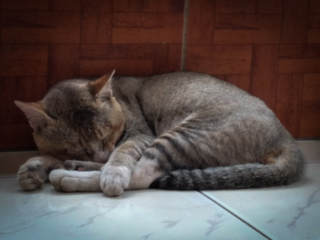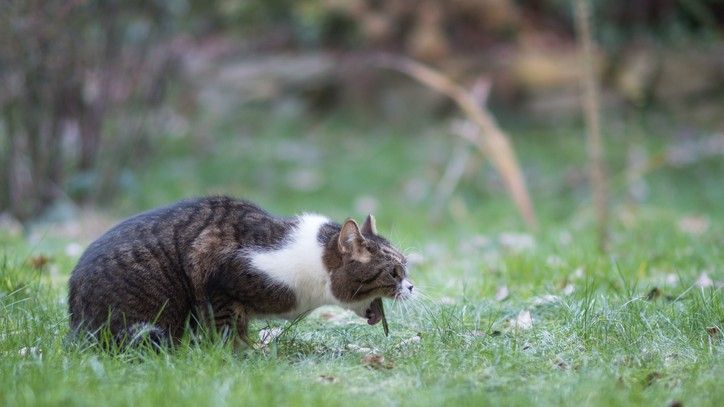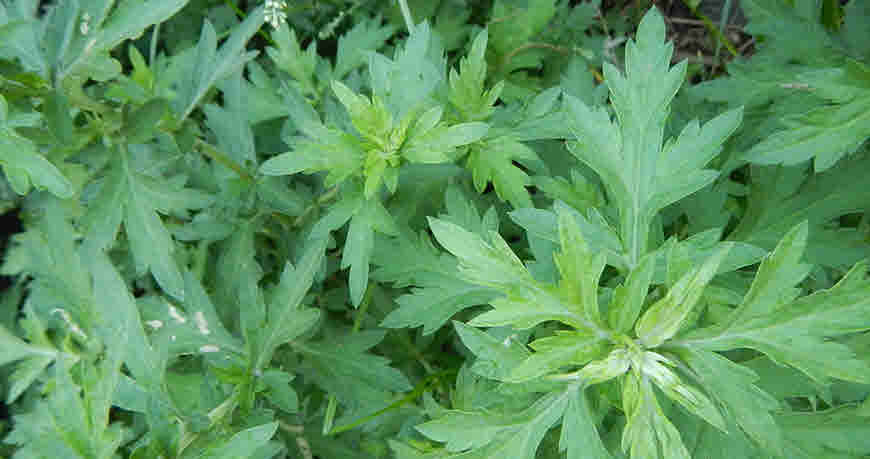Mugwort (Artemisia vulgaris) is a perennial herb that is native to Europe and Asia but can now be found in many parts of the world.
Mugwort is a member of the daisy family and it has several common names, including wild wormwood, common wormwood, and felon herb.
It is known for its strong, pungent aroma and has a long history of use in traditional medicine and as a seasoning in food.
It is also sometimes used as an ingredient in natural remedies for a variety of health conditions.
The plant is found in a variety of habitats, including waste areas, fields, and along roadsides.
It is often found in areas with poor soil and can be a pesky weed in gardens.
Is Mugwort Safe For Cats?

Mugwort may be safe for cats if given in low dosages and for short-term use.
However, it contains some substances that might be toxic to your kitty, so you should desist from giving it to her unless by the express permission and direction of your vet.
Mugwort has been traditionally used as a home remedy for cats and dogs both as an upper GI tonic and a relaxing nervine.
Even though this herb may actually work great, you may want to be careful before you consider using it.
Talk to your vet about it first to ascertain if your dog can handle it because this herb may actually be toxic to your kitty and cause you more harm than good.
And no, the cat doesn’t have to consume the herb for the toxicity to kick in—even an innocent sniff may be all it takes.
If your cat consumes, sniffs, or comes into contact with Mugwort, there is a good chance she will start vomiting, having diarrhea, or even having seizures.
The following are the compounds in Mugwort that make it unsafe for your cat:
1. Thujone
Thujone has neurotoxic properties and as pharmacological studies show, it can affect the central nervous system thereby resulting in seizures.
As such, this compound can cause your cat to start having the same kind of seizures that a cat that has epilepsy would have.
2. Isopinocam Phone
Isopinocam phone is an essential oil that is found Mugwort and like most other essential oils, it is unsafe for your cat.
In fact, vets advise pet parents to keep their cats away from essential oils because most of these oils are toxic to cats.
This is not only true for ingesting but also for topical application.
3. Cineole
This is another essential oil that can be found in Mugwort although it is more commonly found in eucalyptus.
Studies have shown that Cineole can be toxic even in small quantities, so you may want to avoid it just to keep your cat safe.
4. Terpene
Terpene is another compound found in Mugwort that is toxic to both cats and dogs.
It is known to cause diarrhea and vomiting if consumed.
In addition to these compounds, the sap in Mugwort is an irritant for most cats and will not only irritate them but also cause them to be nauseated.
For these reasons, you should avoid using Mugwort as a home remedy for your cat before consulting with your vet.
Dangers of Mugwort for Cats

As we have already established, Mugwort is a plant that can be toxic to cats if ingested.
Some of the dangers of Mugwort for cats include:
A. Vomiting
Vomiting can cause a cat to lose fluids, which can lead to dehydration.
Dehydration can be a serious problem for cats, as it can affect their organ function and lead to other health problems.
If a cat is vomiting frequently, she may not be able to keep food or fluids down, which can lead to malnutrition.
Malnutrition can weaken a cat’s immune system and make them more susceptible to illness.
B. Diarrhea
Mugwort can also cause diarrhea in cats, which can also lead to dehydration and electrolyte imbalances.
Electrolyte imbalances occur when the levels of electrolytes in a cat’s body are not in the proper balance.
Electrolytes are substances that conduct electricity when dissolved in water and are important for maintaining proper organ function.
Several different electrolytes are important for cats, including sodium, potassium, and chloride.
These electrolytes help to regulate the balance of fluids in the body and are essential for normal heart, muscle, and nerve function.
C. Loss of Appetite
Mugwort can cause a loss of appetite in cats, which can lead to malnutrition if left untreated.
This could potentially lead to weight loss, a dull coat, general weakness, poor muscle tone, and decreased immune function.
D. Damage to the Central Nervous System
Damage to the central nervous system (CNS) in cats can have serious consequences and can affect a cat’s ability to move, think, and sense her surroundings.
The CNS consists of the brain and spinal cord, and it is responsible for controlling and coordinating the body’s functions.
The Verdict…
Mugwort may have some medicinal benefits for your cat but the dangers outweigh the benefits.
Mugwort is toxic to cats and there is a good chance your cat will suffer from vomiting, diarrhea, and loss of appetite.
In some cases, the toxicity of the Mugwort may even lead to irreparable damage to your kitty’s central nervous system and that can have a huge impact on the quality of life for your cat.
As such, avoid using Mugwort on your cat and consult the vet if there is accidental contact/ingestion.

Hi! I am Eleanor Price. I started this website after my cat, Louie, almost died from a case of botulism (a type of food poisoning often caused by bacteria that grow on food items). Turned out that my cat’s diet was the problem. I have made it my duty to provide the best information and recommendations about everything cat lovers need to know about their felines’ health and wellbeing. My goal is to find the most informative content on anything feline-related and share it with fellow hardworking kitty lovers.

